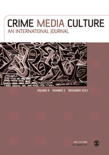
Crime Media Culture
Scope & Guideline
Unraveling the Threads of Crime in Media Narratives
Introduction
Aims and Scopes
- Cultural Criminology:
The journal emphasizes cultural criminology, which examines the cultural contexts of crime, exploring how crime is represented in various media forms and how these representations influence public perception and policy. - Media Representation of Crime:
A core area of focus is the analysis of media representations of crime, including news coverage, films, and social media, and their impact on societal attitudes towards crime and justice. - Intersectionality and Social Justice:
The journal explores themes of intersectionality, particularly how race, gender, and class intersect in the context of crime and justice, advocating for social justice through critical analysis. - Technological Impact on Crime and Policing:
There is a consistent focus on the implications of technology in crime and policing, including the role of digital media, surveillance, and datafication in shaping contemporary understandings of crime. - Narrative and Storytelling:
The journal places importance on narrative approaches to understanding crime, including storytelling in various media forms and its effects on public discourse and policy.
Trending and Emerging
- Digital and Online Crime:
An increasing number of articles are exploring the implications of digital technology and social media on crime, including issues of cybercrime, online harassment, and the role of digital platforms in shaping criminal narratives. - Cultural Responses to Extremism:
There is a growing focus on cultural responses to extremism, particularly in relation to far-right movements and their representation in media, reflecting societal concerns about radicalization and public safety. - Pandemic Policing and Social Control:
Recent themes have emerged around the effects of the COVID-19 pandemic on policing practices and social control mechanisms, examining how public health measures intersect with criminal justice. - Environmental Criminology:
The journal is increasingly addressing environmental criminology, exploring how ecological and environmental issues intersect with crime, particularly in relation to climate change and justice. - Visual and Sensory Methods in Criminology:
There is a trend towards employing visual and sensory methodologies in criminological research, reflecting a broader interest in how visual culture and sensory experiences shape understandings of crime and justice.
Declining or Waning
- Traditional Law Enforcement Practices:
There has been a noticeable reduction in papers focusing solely on traditional law enforcement practices without the critical lens of cultural or media analysis, indicating a shift towards more nuanced discussions. - Purely Quantitative Studies:
The journal appears to be moving away from purely quantitative studies of crime statistics and law enforcement effectiveness, favoring qualitative and critical approaches that examine the cultural implications of crime. - Historical Criminology:
While historical perspectives remain relevant, there has been a decrease in publications focusing exclusively on historical criminology, suggesting a shift towards contemporary issues and their cultural implications.
Similar Journals

JOURNAL OF QUANTITATIVE CRIMINOLOGY
Advancing the Science of Crime AnalysisJOURNAL OF QUANTITATIVE CRIMINOLOGY, published by Springer/Plenum Publishers, serves as a premier outlet for cutting-edge research in the fields of law and forensic medicine. With an impressive impact factor and ranked in the top quartile (Q1) of both Law and Pathology and Forensic Medicine categories in 2023, this journal excels in providing empirical analyses and quantitative assessments that address critical issues in criminological research. Since its inception in 1985, the journal has maintained a reputation for excellence, evidenced by its high standing in Scopus rankings—21st out of 1025 in Social Sciences (Law) and 23rd out of 208 in Medicine (Pathology and Forensic Medicine). Although currently not an open access publication, it offers several subscription-based access options to reach a wide array of academics and professionals dedicated to the advancement of criminological and forensic inquiries. Researchers, professionals, and students will find the JOURNAL OF QUANTITATIVE CRIMINOLOGY an invaluable resource, as it fosters interdisciplinary collaboration and methodological rigor in understanding crime and criminal behavior.
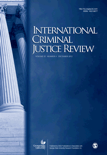
International Criminal Justice Review
Fostering innovative solutions for international crime.International Criminal Justice Review is a premier journal in the field of law, published by SAGE Publications Inc, renowned for its commitment to advancing the understanding of criminal justice issues on a global scale. With an ISSN of 1057-5677, this journal spans a rich history from its inception in 1991 to its ongoing contributions into 2024, supporting a diverse array of research that addresses both theoretical and practical concerns in international criminal law. The journal holds a prestigious Q1 ranking in the Law category for 2023, reflecting its influence and relevance, as evidenced by its impressive Scopus rank of #68 out of 1025 in the Social Sciences Law field, placing it in the 93rd percentile. Though not an open-access journal, it provides vital access options for institutions and individuals alike. International Criminal Justice Review serves as a critical resource for researchers, practitioners, and students dedicated to exploring the complexities of international criminal justice systems, offering a platform for innovative scholarship that informs policy and practice worldwide.

Trends in Organized Crime
Analyzing the Impact of Organized Crime on SocietyTrends in Organized Crime, published by SPRINGER, is a premier journal dedicated to the exploration and analysis of organized crime phenomena. With an impressive impact factor and ranked in the Q1 category for Law, this journal reflects the highest echelon of scholarly work, positioning itself at the forefront of legal and social sciences research. Established in 1995 and extending its impact through 2024, the journal serves as a crucial resource for academics, practitioners, and policymakers seeking to understand the complexities of organized crime and its implications on society. While not an Open Access journal, it provides robust access options for scholarly articles, making it a vital tool for those engaged in legal studies and criminology. By fostering interdisciplinary dialogues, Trends in Organized Crime aims to illuminate contemporary issues, promote innovative methodologies, and enhance the collective understanding of criminal organizations globally.
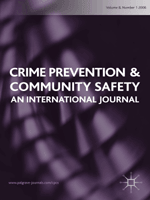
Crime Prevention & Community Safety
Driving dialogue between theory and practice in safety research.Crime Prevention & Community Safety is a leading academic journal published by Palgrave Macmillan Ltd, dedicated to advancing scholarship in the fields of law, sociology, and safety research. With an ISSN of 1460-3780 and an E-ISSN of 1743-4629, this journal serves as a vital resource for researchers, practitioners, and policymakers interested in the complexities of crime prevention and community safety strategies. Since its inception in 1999, the journal has covered diverse topics and methodologies, making significant contributions to understanding social behaviors and preventative measures in communities. The journal currently holds a respectable Q3 ranking across multiple categories including Law, Sociology and Political Science, and Safety Research, reflecting its importance within these fields as ranked by Scopus. Despite its emphasis on rigorous research, access options are traditional rather than open access, making its scholarly works available through institutional subscriptions. The journal actively seeks to foster dialogue among academics and practitioners, aiming to drive both theoretical understanding and practical intervention in crime and safety initiatives. Join the community of scholars in exploring innovative and impactful strategies aimed at enhancing community safety and reducing crime.
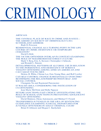
CRIMINOLOGY
Pioneering Research at the Intersection of Law and Medicine.CRIMINOLOGY, published by WILEY, stands as a leading journal in the fields of Law and Forensic Medicine, with an impressive impact factor that places it in the Q1 quartile for both categories. With its ISSN 0011-1384 and E-ISSN 1745-9125, this esteemed journal has been at the forefront of advancing knowledge and understanding in criminological theories and practices since its inception in 1963, and continues to be relevant through 2024. As of 2023, CRIMINOLOGY is ranked #19 in Social Sciences_ Law and #19 in Medicine_ Pathology and Forensic Medicine, positioning it within the top 2% of its field, making it an essential resource for researchers and professionals alike. Despite not offering open access, it provides invaluable insights into the complexities of crime, law enforcement, and societal impacts, thus shaping the future of criminological research and policy.

Asian Journal of Criminology
Pioneering Research for a Safer Asian SocietyAsian Journal of Criminology, published by SPRINGER, stands as a pivotal platform for scholarly communication within the field of criminology, boasting a notable impact factor and achieving a distinguished Q1 ranking in Law for 2023. Located in the Netherlands, this journal addresses the complexities of crime and justice in Asian contexts, fostering interdisciplinary discourse between researchers, practitioners, and policymakers. Since its inception in 2006 and continuing through to 2024, the journal has published a range of high-quality articles that explore theoretical frameworks, empirical research, and practical applications in criminology. Although the journal is not open access, it remains accessible through academic libraries and institutions, ensuring its wide reach among scholars and students. With a Scopus ranking of 143 out of 1025 in the field of Social Sciences Law, placing it in the 86th percentile, the Asian Journal of Criminology is essential for anyone looking to stay at the forefront of criminological research and its application in diverse societal contexts.

Trends and Issues in Crime and Criminal Justice
Advancing knowledge in crime and justice.Trends and Issues in Crime and Criminal Justice is a leading journal in the field of criminology, published by the Australian Institute of Criminology. This esteemed journal, recognized with an H-index that reflects its influence and contribution to the social sciences, particularly law, spans from 2011 to 2024 and is ranked in the Q1 category within its discipline according to the 2023 data. With a Scopus ranking of #123 out of 1025 in the Social Sciences - Law category, placing it in the 88th percentile, it serves as a critical resource for researchers, practitioners, and students alike.
Focused on innovative research and emerging issues within crime and criminal justice, the journal seeks to foster scholarly collaboration and discourse, making it an essential hub for new ideas and evidence-based practices in the field. The journal’s commitment to advancing knowledge and influencing policy ensures that it remains an influential voice in criminological studies, aiming to address pressing issues facing societies globally.

Belphegor
Empowering Scholars with Open Access InsightsBelphegor is a distinguished open-access academic journal published by the Department of French at Dalhousie University, specializing in the fields of French literature, cultural studies, and linguistics. With its ISSN 1499-7185, the journal has been an essential resource for researchers and academics since its inception in 2011, providing a platform for innovative scholarship and critical discourse. Located in Halifax, Canada, the journal encourages the exploration of contemporary and historical issues within the Francophone world, aiming to foster intercultural dialogue and understanding. Through its commitment to accessible research, Belphegor significantly contributes to the academic landscape, making valuable contributions to both local and international scholarly communities.

Logos Ciencia & Tecnologia
Fostering collaboration to tackle today's societal challenges.Logos Ciencia & Tecnologia is a distinguished open-access journal dedicated to the fields of science and technology, published by Policia Nacional Colombia. Since its inception in 2009, it has been committed to disseminating high-quality research that addresses contemporary issues in criminology, forensic science, and information technology. With an ISSN of 2145-549X and an E-ISSN of 2422-4200, the journal ensures that vital insights are accessible to researchers, professionals, and students worldwide. The journal aims to foster interdisciplinary knowledge transfer, encouraging collaboration among practitioners and academics to advance innovative solutions for societal challenges. As an integral resource for those in academia and industry, Logos Ciencia & Tecnologia champions the importance of rigorous research in enhancing both crime prevention strategies and technological developments in the region and beyond.
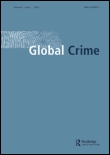
Global Crime
Connecting Disciplines to Transform Criminal JusticeGlobal Crime is a leading scholarly journal published by Routledge Journals, Taylor & Francis Ltd, focusing on the multifaceted dimensions of crime and justice on a global scale. With an ISSN of 1744-0572 and E-ISSN of 1744-0580, this journal serves as a critical platform for researchers, practitioners, and policymakers interested in the intersection of legal studies, political science, and sociological perspectives. The journal boasts a prestigious Q1 ranking in Law and notable Q2 rankings in Political Science and International Relations, as well as Sociology, highlighting its influential role in shaping academic discourse. In 2023, it ranked #88 out of 1025 journals in Law, placing it in the 91st percentile, thus ensuring its status as an essential resource for those engaged in advanced research. While it does not currently offer open access options, Global Crime continuously seeks to illuminate the complexities of crime, fostering a better understanding through comprehensive studies, critical analyses, and innovative approaches. By converging insights from various disciplines, the journal aims to facilitate dialogue among academics and practitioners alike, ultimately advancing the field of criminal justice globally.